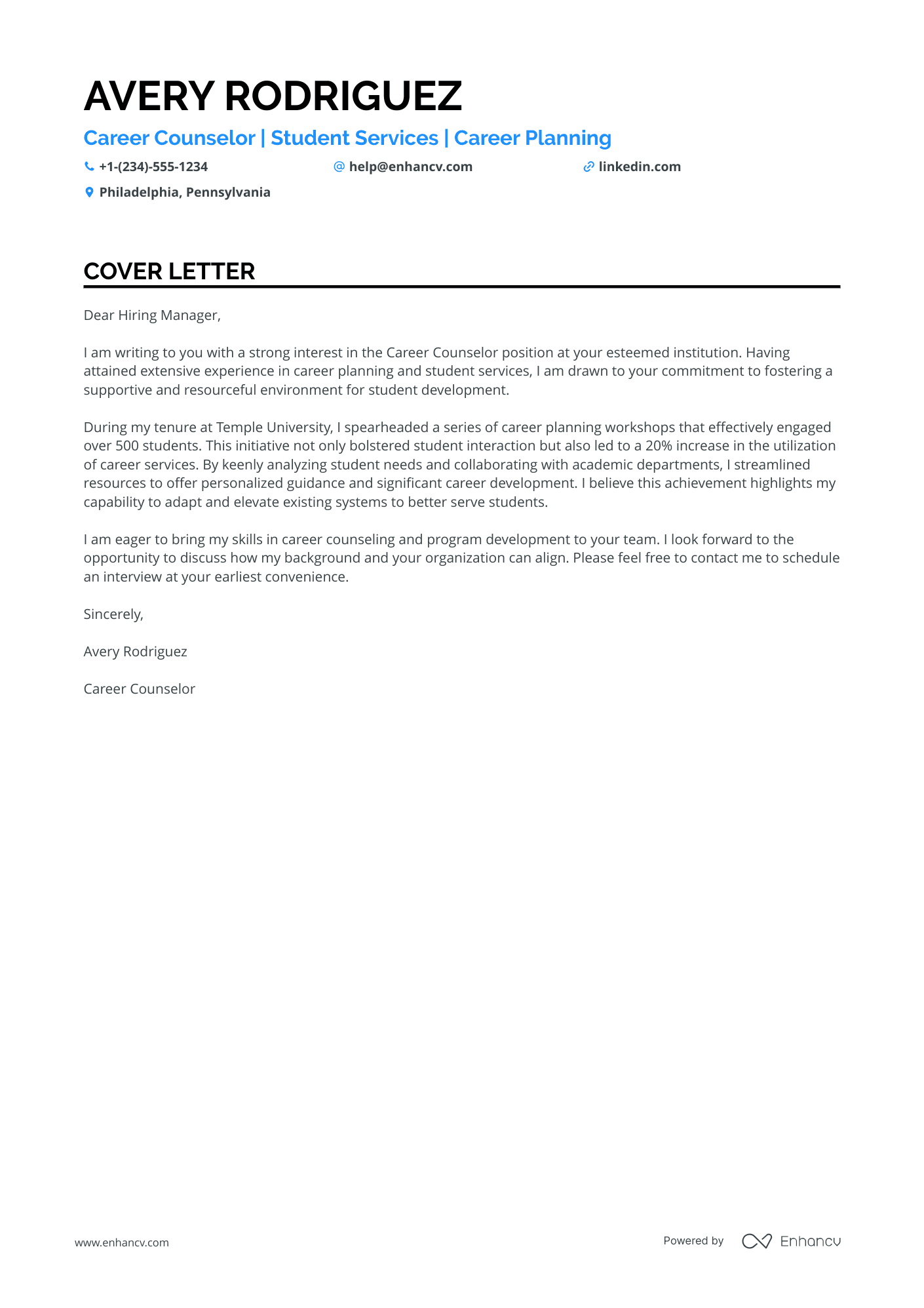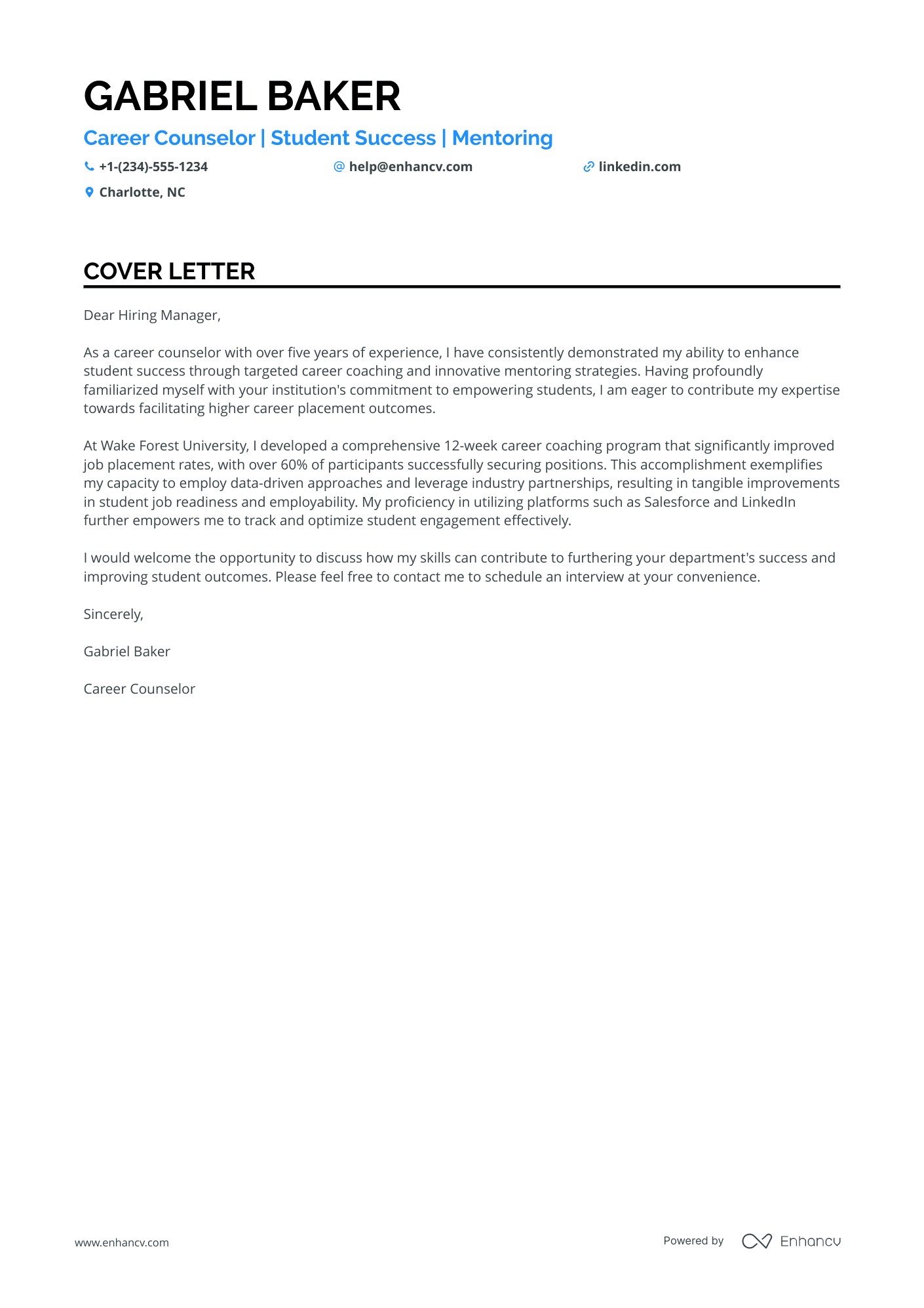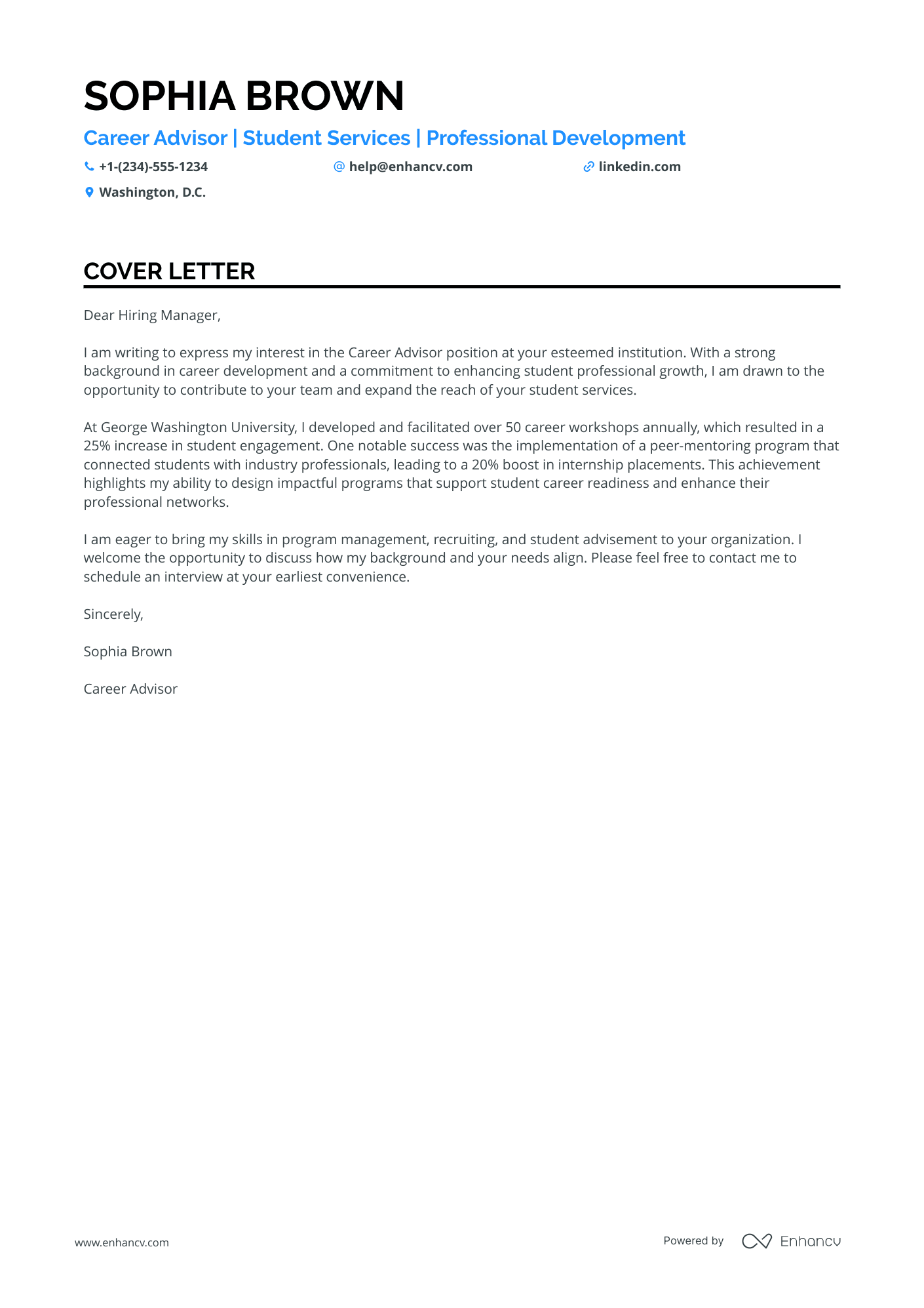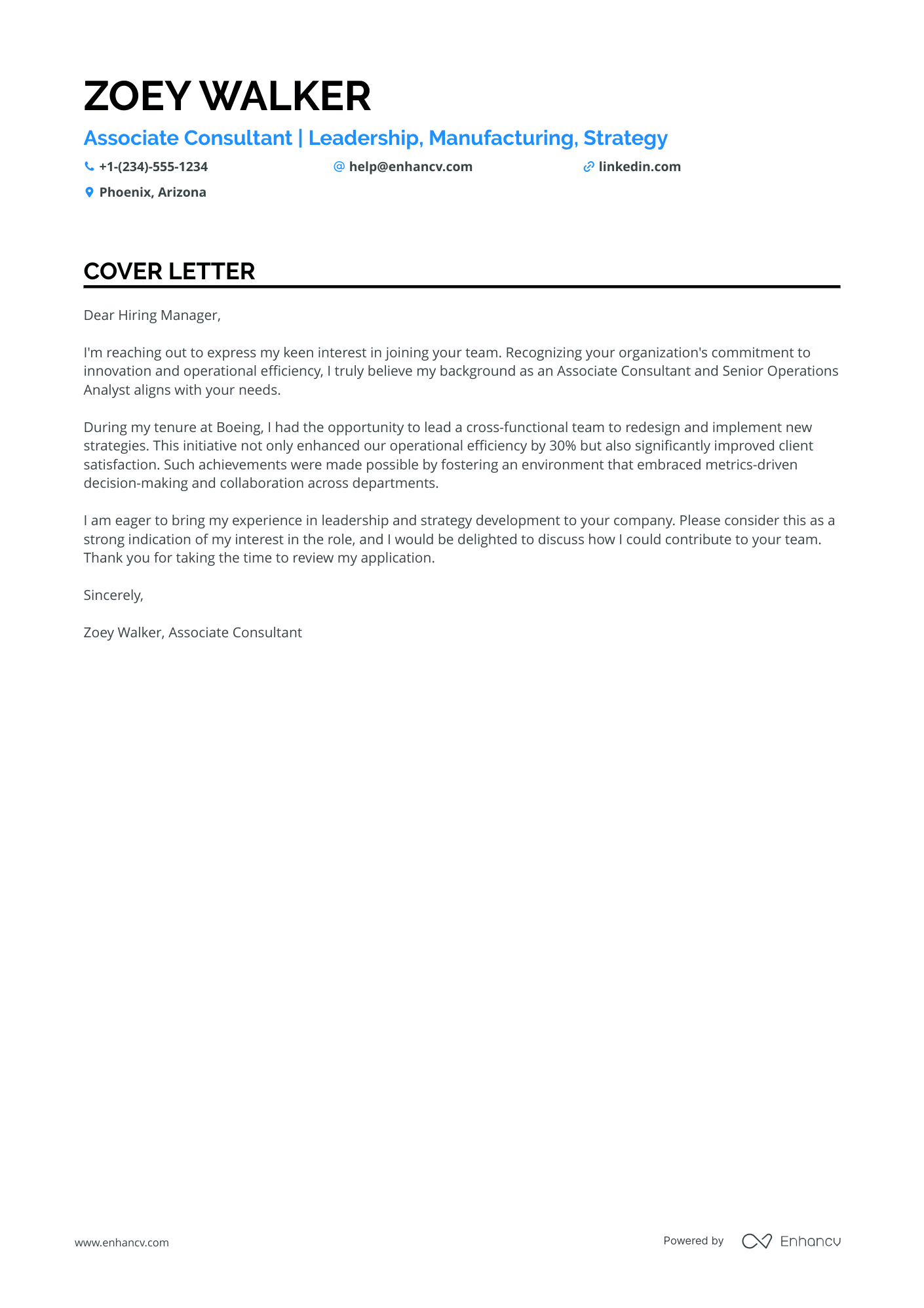Embarking on a career change journey often feels daunting, especially when crafting that pivotal career change cover letter. You've updated your resume and started applying, only to realize that a compelling cover letter is a crucial next step. It's not about rehashing your resume; it's your chance to highlight your proudest professional moment in a narrative that captivates. Striking the right balance between formal tone and avoiding overused phrases, all while keeping your story to one page, is where the real challenge lies.
- Personalize your career change cover letter and get inspired by other professionals to tell a compelling story;
- Format and design your career change cover letter to make an excellent first impression;
- Introduce your best achievement in your career change cover letter to recruiters;
- How to make sure recruiters get in touch with you, using your career change cover letter greeting and closing paragraphs.
What is more, did you know that Enhancv's AI can write your cover letter for you? Just upload your career change resume and get ready to forward your job application in a flash.
If the career change isn't exactly the one you're looking for we have a plethora of cover letter examples for jobs like this one:
- Career Change resume guide and example
- Military to Civilian cover letter example
- Volunteer cover letter example
- Returning to Work cover letter example
- Work from Home cover letter example
- Campus Director cover letter example
- Stay at Home Mom cover letter example
- US cover letter example
- ATS cover letter example
- Spanish Translator cover letter example
- Non Profit cover letter example
Career Change Cover Letter Example
Victoria Baker
Des Moines, Iowa
+1-(234)-555-1234
help@enhancv.com
- Emphasize relevant project experience: The cover letter highlights the candidate's ability to manage a significant healthcare project, such as the digitization of patient education tools, showcasing an understanding of how to integrate technology within healthcare effectively.
- Demonstrate measured success: Mentioning a specific quantifiable outcome (40% increase in patient engagement) proves the candidate’s claim of impact and success, which is essential for roles focusing on improving processes and outcomes.
- Show alignment with company values: The applicant aligns personal professional values with the company’s objectives, such as enhancing user engagement, which demonstrates an understanding of and a fit with the company culture.
- Express relevant soft skills: The cover letter points out the candidate's skills in project management, teamwork, and design principles, which are pertinent to the job's requirements and the effective execution of responsibilities.
What Should Your Career Change Cover Letter Look Like - Formatting and Organizing Your Information
Have you ever wondered what are the must-have sections you need to include in your career change cover letter? Our builder sets those up for you with:
- Header - dedicated to your contact information, the role you're applying for, and the date (don't forget to include your name);
- Greeting and opening paragraph - to create a personalized and memorable experience for recruiters;
- Body paragraph - emphasizing your skill set and knowledge that aligns with the role and helps you to stand out;
- Closing paragraph - leaving a great impression and ending with an optional signature.
Use a cover letter template to discover the best formatting for your career change cover letter: that is single-spaced paragraphs and wrapping your content in a one-inch margin.
Ensure that both your resume and career change cover letter are in the same font. Stand apart from the crowd by using modern, yet simple fonts, like Chivo and Rubik, instead of the overused Arial and Times New Roman.
Did you know that the Applicant Tracker System (or ATS) won't be assessing your career change cover letter? Instead, submit your profile in PDF to recruiters to keep the same formatting and the design intact.
Don’t stress about writing your cover letter. Use our free cover letter generator to make one in seconds.
The top sections on a career change cover letter
- Header: Include your contact information, the date, and the employer's contact information, which shows professionalism and makes it easy for the recruiter to reach you.
- Greeting: Address the hiring manager by name if possible, as personalizing the cover letter can grab the recruiter's attention and demonstrate your attention to detail.
- Introduction: Clearly state your intent to change careers and the specific role you're applying for, laying the groundwork for your rationale and passion for this new path.
- Career Transition Explanation: In one or two paragraphs, articulate why you are changing careers and how your previous experiences have equipped you with transferable skills relevant to the new role.
- Conclusion and Call to Action: End with a strong closing statement that reiterates your enthusiasm for the role, thanks the recruiter for their consideration, and suggests a follow-up meeting or phone call to discuss your application further.
Key qualities recruiters search for in a candidate’s cover letter
Unfortunately, without a specified job title, it's impossible to list qualities, experiences, and traits unique to that role. Job titles come with different expectations. A software developer would need technical expertise in programming languages, while a sales position would prioritize customer relations and a track record of sales achievements. Please provide a specific job title for a tailored response.
How to Personalize Your Career Change Cover Letter Greeting
Before you start writing your career change cover letter, take the time to find out who is recruiting for the role.
Search for the recruiter's name on LinkedIn or the corporate website to address them personally in your career change cover letter salutation.
What if you can't find out who's recruiting for the role?
Always aim to avoid the very impersonal "Dear Sir/Madam" - instead, opt out for "Dear HR Team" or "Dear Hiring Manager" to make a better first impression.
List of salutations you can use
- Dear Hiring Manager,
- Dear [Department] Team,
- Dear [Company Name] Recruiter,
- Dear [Mr./Ms. Last Name],
- Dear [Title] [Last Name],
- Dear [First Name] [Last Name],
Using Your Career Change Cover Letter Intro to Show Your Dedication
We know just how difficult it is to start writing your career change cover letter introduction.
There are so many great qualities you have as a professional, which one should you choose?
How about writing up to two sentences about your passion and commitment to the work you do or are set to do?
Try to describe exactly what you enjoy about the potential role.
A positive attitude from the get-go will help you stand out as a motivated career change professional.
How to Select Your Best Achievement for the Middle, Or the Career Change Cover Letter Body
You probably feel exhausted by this point in your application: you've dived into all the details of your success and skills in your career change resume.
What else can you include in your career change cover letter body?
Well, for starters, the next three to six paragraphs should show you further value as a professional. Or, why should recruiters choose you?
Think back on a noteworthy achievement that answers key job requirements and dive deep.
Structure your career change cover letter middle as you'd a story: following chronological logic and highlighting outcomes, thanks to skills.
At the end of the day, you'd want recruiters to be able to see you as the best candidate for the role and understand more about who you are and what makes your success unique (and valuable to the role).
A Sincere and Original Way to End Your Career Change Cover Letter
When writing their career change cover letter, candidates tend to use one of these phrases, "Sincerely yours" or "I look forward to hearing from you".
Both statements show good manners, but your cover letter should end in a more actionable manner.
Write about:
- how you see yourself growing in the role/organization;
- the benefits you would bring about (you'd impress even more with tangible metrics);
- the next steps in the process (provide your availability for interviews).
No Experience Career Change Cover Letter: Making the Most Out of Your Profile
Candidates who happen to have no professional experience use their career change cover letter to stand out.
Instead of focusing on a professional achievement, aim to quantify all the relevant, transferrable skills from your life experience.
Once again, the best practice to do so would be to select an accomplishment - from your whole career history.
Another option would be to plan out your career goals and objectives: how do you see yourself growing, as a professional, in the next five years, thanks to this opportunity?
Be precise and concise about your dreams, and align them with the company vision.
Key Takeaways
Creating your career change cover letter should be a personalized experience for the role and the recruiter, where you:
- Format your cover letter using the same ATS-friendly font (e.g. Railway) as you did for your resume;
- Greet recruiters, using their name, and follow up with two sentences to introduce yourself, your interest in the role, and to stand out;
- Map out one key success from your career (or life) that has taught you job-crucial skills;
- Substitute your lack of experience with an achievement from your internships, degrees, or volunteering gigs;
- End with a promise for your potential or your availability for an interview.
Career Change cover letter examples
By Role
Career Change Counselor
- Highlighting Quantifiable Achievements: Mentioning specific outcomes, such as a "20% increase in the utilization of career services," demonstrates the effectiveness and impact of past initiatives.
- Emphasizing Relevant Experience: Drawing attention to experience in career planning and student services directly ties into the responsibilities associated with a career counselor role.
- Demonstrating Leadership and Initiative: Leading career planning workshops and engaging a substantial number of students shows both leadership qualities and the ability to take proactive steps in student development.
- Tailoring to the Institution's Mission: Expressing alignment with the institution's commitment to fostering a supportive environment highlights the applicant’s interest in contributing positively to the organizational culture.
Career Change Coach
- Highlight specific achievements that demonstrate successful outcomes, such as the development of a program that significantly improved job placement rates.
- Mention specific skills and tools that are relevant to the role, such as proficiency in using platforms like Salesforce and LinkedIn for tracking and optimizing student engagement.
- Emphasize experience with developing and executing data-driven approaches and leveraging industry partnerships to enhance student support and career readiness.
- Express familiarity with the institution's mission or values, showing alignment with their goals and a clear understanding of the impact you wish to make in the role.
Career Change Advisor
- Demonstrating direct impact: The cover letter highlights tangible outcomes such as a 25% increase in student engagement and a 20% boost in internship placements, showcasing the candidate's ability to make a measurable difference.
- Program development experience: Mention of developing and facilitating over 50 career workshops annually demonstrates the candidate's experience in creating and executing initiatives that support student development.
- Networking and mentorship skills: Implementation of a peer-mentoring program illustrates the candidate's strengths in fostering professional connections and creating opportunities for students to engage with industry professionals.
Career Change Consultant
- Alignment with Company Goals: The letter emphasizes how the applicant's skills and experiences align with the company's focus on innovation and operational efficiency, showcasing a clear understanding of the organization's objectives.
- Specific Achievements: Highlighting a quantifiable achievement, such as improving operational efficiency by 30%, provides tangible evidence of the applicant's impact and capabilities.
- Leadership and Strategy: Emphasizing the ability to lead cross-functional teams and develop strategic initiatives indicates a strong leadership capacity and problem-solving skills relevant to a consulting or senior analyst role.
- Interest and Willingness to Contribute: Expressing a sincere interest in the role and a readiness to discuss potential contributions shows enthusiasm and proactive engagement with the application process.












